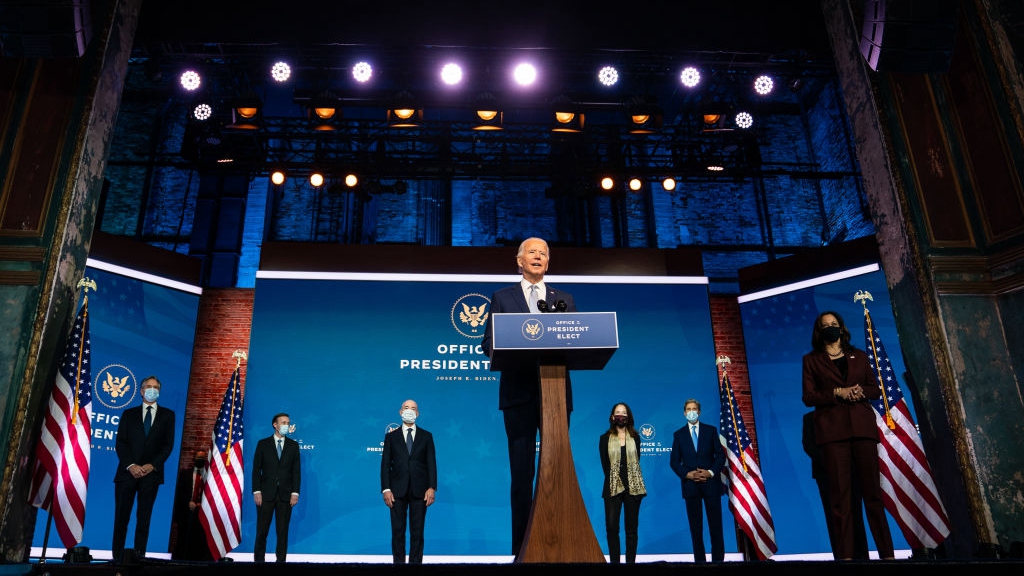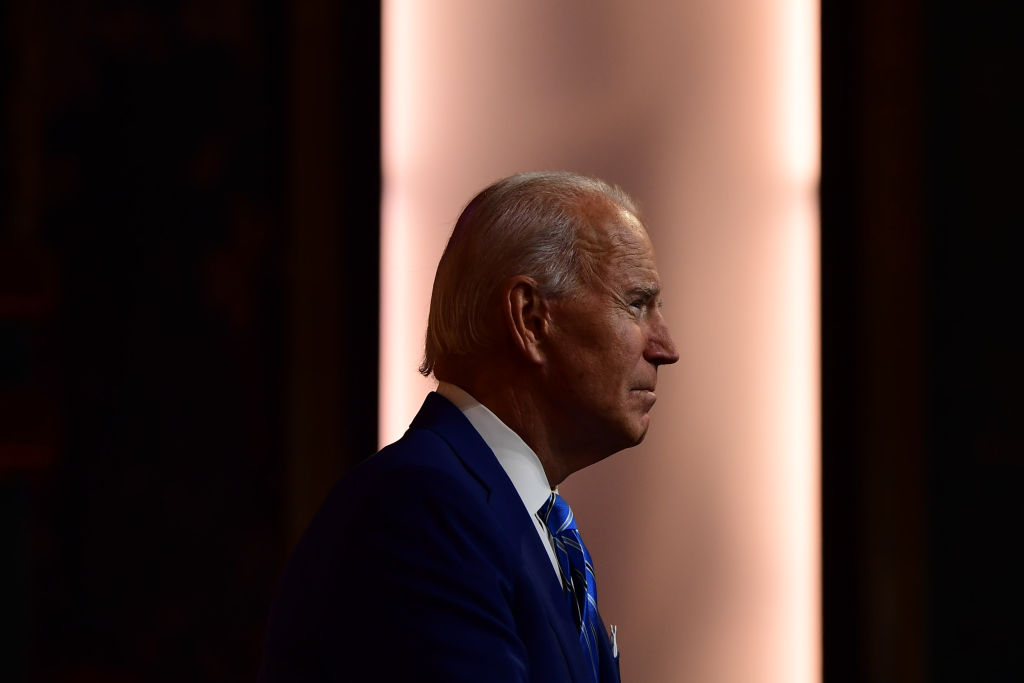
President- elect Joe Biden introduces his cabinet member nominees at the Queen in Wilmington, November 24, 2020. /Getty
President- elect Joe Biden introduces his cabinet member nominees at the Queen in Wilmington, November 24, 2020. /Getty
Editor's Note: Ken Moak taught economic theory, public policy and globalization at the university level for 33 years. He co-authored the book "China's Economic Rise and Its Global Impact" in 2015. The article reflects the author's opinions and not necessarily the views of CGTN.
In light of president-elect Joe Biden's key cabinet nominees, one could assume the new administration will reverse Trump's "America First" or anti-globalization polices. Biden's nominee for the U.S. Secretary of State Antony Blinken was known as an "internationalist" during his days as former President Barack Obama's Deputy Secretary of State and Deputy National Security Adviser.
Biden's nomination of former Secretary of State John Kerry as the frontman on climate change suggests the president-elect intends to follow through with his campaign promises. Treasury secretary nominee Janet Yellen and U.S. ambassador to the United Nations Linda Thomas-Greenfield favor a multilateral approach to address issues.
These are just a few of a list of "multilateralists" that Biden picked for senior official positions
To that end, Biden seems to be on track to reverse Donald Trump's policies: rejoining the Paris Accord, rescinding the decision to withdraw from the World Health Organization, participating in reforming the World Trade Organization and other anti-globalist stances. The world, including the U.S., would likely rejoice if Biden follows through with his campaign vows.
Trump's policies had harmed U.S. and global economic and security interests. Imposing tariffs on goods imported from friends and foes in the name of national security, for example, disrupted international trade and undermined U.S. economic growth.
Banning Chinese made products unnecessarily raised telecommunication costs and delayed 5G network for years. Establishing the "Indo-Pacific" strategy of forming an "Asian NATO" to counter China risked regional security, forcing countries to pick sides.
It, however, is easy to tell that multilateralism is the way going forward as the world is increasingly interconnected and interdependent in fields such as the economy, technology, healthcare, security, just to name a few. For instance, climate change cannot be addressed without international cooperation, particularly from China.
Most U.S. politicians are aware of that "internationalism" might be the key to addressing America's problems, but they are strongly against a cooperative U.S.-China relationship, saying the country is the "greatest threat" to American ideals and values.

President-elect Joe Biden delivers a Thanksgiving address at the Queen Theatre in Wilmington, Delaware, November 25, 2020. /Getty
President-elect Joe Biden delivers a Thanksgiving address at the Queen Theatre in Wilmington, Delaware, November 25, 2020. /Getty
Republican senators Marco Rubio and Tom Cotton already stated on November 25 that they will vote against the Biden nominees if they do not get "tough" on China. Cotton, in fact, called Biden's nominees "panda huggers", suggesting they would be "soft" on the communist country. Sadly, economic and geopolitical logic take a backseat to politics and ideology.
A U.S.-China rapprochement could thus be a political minefield in which Biden must navigate carefully. Liberals and conservatives would "hammer" Biden because while the two opposite ends of the ideological spectrum disagree on a host of issues, their common denominator is crushing any nation that is in a position to challenge U.S. supremacy.
Biden, being a seasoned politician is well aware of the pitfalls of being "soft" on China, thus limiting the level of cooperation from the country. The president-elect cannot be seen as "giving away the family farm" as that would give Trump or his surrogates ammunition to trounce him, vice-president-elect Kamala Harris or other Democratic Party nominee in the 2024 presidential election cycle.
Furthermore, because of domestic politics, Biden and his nominees might be forced to become the ones who support "America First", suggesting that they differ on globalization from Trump only in style. For example, the president-elect, perhaps to please the domestic audience, made it clear that he wants the 21st Century to be an "American Century".
The fact of the matter is that American politics is very much self-serving, and globalization or multilateralism is only accepted as long as the U.S. writes the rules. Biden probably understands that, prompting him to state "America is back" speech immediately after Trump approved a smooth presidential transition.
However, the world has changed, becoming more interdependent and interconnected with the rise of China and other major economies. Thanks to the U.S.-inspired global supply chain in which the production of a product is carried out across many nations, America requires international cooperation to enhance and sustain economic growth.
China, being the world's second largest economy, must be in the conversation to reduce global warming and reform the trading system. Against this backdrop, Biden will promote some form of "quasi multilateralism", pressuring allies to accept U.S. leadership and zigzagging between "competition" and "cooperation" with China.
(If you want to contribute and have specific expertise, please contact us at opinions@cgtn.com)

